Back to Journals » Advances in Medical Education and Practice » Volume 10
Community pharmacists’ knowledge, attitude, and practice of Irritable Bowel Syndrome (IBS): the impact of training courses
Authors Mahmoudi L , Shafiekhani M, Dehghanpour H, Niknam R
Received 19 January 2019
Accepted for publication 6 May 2019
Published 19 June 2019 Volume 2019:10 Pages 427—436
DOI https://doi.org/10.2147/AMEP.S201904
Checked for plagiarism Yes
Review by Single anonymous peer review
Peer reviewer comments 2
Editor who approved publication: Dr Md Anwarul Azim Majumder
Laleh Mahmoudi,1 Mojtaba Shafiekhani,1 Hamed Dehghanpour,1 Ramin Niknam2
1Department of Clinical Pharmacy, School of Pharmacy, Shiraz University of Medical Sciences, Shiraz, Iran; 2Gastroenterohepatology Research Center, Shiraz University of Medical Sciences, Shiraz, Iran
Introduction: Irritable Bowel Syndrome (IBS) is a common chronic functional gastrointestinal disorder. Pharmacists have a vital role in patient education and in drug-therapy management for IBS. This survey is the first study in Iran, to evaluate knowledge, attitude, and practice (KAP) of community pharmacists on IBS, and the impact of training courses on the improvement of their skills.
Objective and setting: This pre- and post-cross-sectional study was conducted to evaluate IBS-KAP amongst Community pharmacists in Shiraz, Iran.
Methods: Pretested questionnaires were designed to assess professional characteristics and KAP components of the community pharmacists regarding IBS. All pharmacists from Shiraz were invited to participate in a 3-day training course on IBS. The participants were requested to complete the questionnaire before commencing the training course (pre-test), at the end of the 3-days course (post-test), and also 3 months after the course (follow-up test).
Results: Correct answers to all parts increased after the training course, as well as in the follow-up stage, which was statistically significant in all three parts (P<0.05). The increases in correct answers were seen in the fields of attitude, practice, and knowledge.
Conclusion: It seems that continuing IBS training courses are essential for pharmacists, regarding the fact that they can play an important role in assisting patients with IBS, as they are easily accessible healthcare professionals.
Keywords: attitude, practice, knowledge, Irritable Bowel Syndrome, pharmacist
Introduction
Irritable bowel syndrome (IBS) is a complex gastrointestinal condition that its pathophysiology is not well-understood. This chronic functional gastrointestinal disorder affects 9–23% of the world population.1 The overall prevalence of IBS in Iranian patients has been reported to be within 1.1% and 25%.2 IBS is usually defined by the presence of abdominal pain and is associated with changes in the frequency or consistency of stool.3 Due to the lack of specific laboratory or imaging tests, IBS diagnosis should be clinical and symptom-based. The exact etiologic mechanism of IBS is still unknown, and there is no specific marker for its identification.3 Due to variations in symptoms, IBS diagnosis is not always easy and, because of these uncertainties, IBS is a diagnosis of exclusion. The ROME-III criteria have been widely used for the diagnosis of functional gastrointestinal disorders including IBS.4
It is well known that IBS symptoms negatively impact patients’ quality-of-life. The frustrating symptoms of IBS, as well as its chronic nature, lead patients to constantly seek medical care. Being unaware of having IBS, most patients initially self-treat with OTC medications.5 Studies from the US have estimated the annual cost per patient with IBS to be $742–7,547 USD.6 Due to the lack of definitive treatment for IBS and the presence of associated comorbidities, some patients constantly change their physician, which creates a condition called “doctor shopping”.7 Pharmacists have a vital role in patient education and in the drug-therapy management for IBS, and they can help ensure safe and efficacious treatment.5 Therefore, it is essential for pharmacists to have an ample amount of knowledge on IBS in order to provide appropriate consultation to physicians and patients; despite this fact a little time is spent on pharmacist-specific training programs on supporting and treating people with IBS in Iran.
In order to provide adequate care by pharmacists to the patients with IBS, the process has to start in pharmacy schools, where these conditions are given equal emphasis compared to other ones, while they are currently considered as more “serious” conditions. Pharmacy students are unlikely to acquire thorough knowledge of such conditions.
Knowing the level of knowledge, attitude, and practice (KAP) regarding common diseases amongst healthcare providers is imperative when designing an effective training program.6–10 Various studies have shown the positive impact of community pharmacists on better patients’ clinical outcomes and cost saving.7,8 The patients expect their pharmacist to give them detailed information regarding their medications, such as adverse effects, drug–drug interactions and comments related to the appropriate use of medicines. To accomplish effective pharmaceutical care practice, community pharmacists need appropriate training courses which enable them to provide valuable drug information and patient care. Continuing training courses after graduation is the most useful way to update pharmacists’ skills; however, knowing what to focus on during these training courses requires accurate assessment of their knowledge, attitude, and practice.
Up to now, some studies were conducted with respect of KAP of physicians regarding IBS,9,10 but this KAP survey is the first study in Iran, and one of the few in the world to evaluate KAP of community pharmacists on IBS, and the impact of training courses on the improvement of their skills.
Method
Study site and period
This cross-sectional study was conducted from January 2017 to June 2017 amongst community pharmacists in Shiraz, Iran. A pre-tested questionnaire was used to assess professional characteristics and KAP of the community pharmacists regarding IBS. Ethical approval for this study was obtained from the ethics Committee of Shiraz University of Medical Sciences, and all participants provided informed consents.
Questionnaire design
This KAP questionnaire consists of 44 questions, of which 31 are related to knowledge, seven questions are attitude, and six questions are practice aspects. To design this questionnaire, we sought the advice of expert gastroenterologists and clinical pharmacists in the field of IBS.
Each question was evaluated for its simplicity and understandability by content experts. Questions were handed out to five gastroenterologists and clinical pharmacists who are experts in the field, and they were asked to rate each item based on its relevance. Ambiguity, clarity, and simplicity were scored on a four-point scale;1 not relevant/clear,2 somewhat relevant/clear,3 quite relevant/clear,4 and highly relevant/clear. For each question, the scores were summed and divided by the total number of experts. Excellent content validity of each item was defined by the value of higher than 0.78.11 In this process, five questions were omitted from the survey due to their complexity, and three questions were simplified for better understanding. In the final questionnaire (Supplementary Appendix 1), internal reliability was calculated by Cronbach’s alpha coefficient. The Cronbach’s alpha coefficient was not increased by omitting any of the questions. A value of higher than 0.7 in Cronbach’s alpha coefficient for each item was considered as reliable.12
After finalizing the questionnaire, it was pre-tested among a randomly selected 20 pharmacists for reliability and clarity of the questions, and necessary changes were made accordingly. These 20 pharmacists were not included in the study.
Study conduction
All pharmacists from Shiraz were invited by Shiraz Medical Council, a non-Governmental Organization, which is responsible for licensing, authorization, and registration of the all healthcare professionals, to participate in a face-to-face 3-day training course on IBS and its management. This course was lead by a gastroenterologist and a clinical pharmacist who were experienced in practicing IBS. Lectures in PowerPoint presentation, its handouts and leaflets for the IBS, KAP assessment questionnaire and lecture feedback form were prepared. The subjects which were reviewed during this 3 day period are as follows:
- Prevalence, symptoms, risk factors, and diagnosis approach in IBS,
- Pharmacotherapy of IBS with new and emerging therapies, and
- Management of IBS according to the last updated guidelines.
These contents were taught in 5-hour sessions over 3 consecutive days; at the end of each day providers introduced several real medical case reports in quiz format, to evaluate the learning level of participants by answering the posed questions.
The community pharmacists were requested to complete the questionnaire before commencing the training course (pre-test), and at the end of the 3-day course (post-test).
We also designed a follow-up program to evaluate the impact of our training course on the pharmacists’ retained data about IBS. For this purpose, a pharmacy student visited the participants in their pharmacies 3 months after the course and asked them to fill out the questionnaire (follow-up test).
The goal of the pre-test was to evaluate baseline knowledge, attitude, and practice skills of the pharmacists about IBS. Post-test and follow-up tests were done to evaluate the impact of the training course and the 3-day refreshing lecture on short-term and long-term skills of the pharmacists who enrolled in the educational course, respectively.
Statistical analysis
The questionnaires were analyzed by the Statistical Package for Social Sciences (SPSS for windows version 20). In analyzing the results of knowledge and practice questions, scores of 1 and 0 were assigned to true and false answers, respectively, and the answers to attitude questions were ranked from 1–5, where a score of 5 represents the most positive attitude.
In order to determine the effective factors on knowledge variables (the total sum of knowledge scores), the independent variables were entered into the regression model. If a score was more than 70% it was considered as good, if a score was 50–70% it was regarded as satisfactory, and if it was less than 50% it was stated as poor for knowledge, attitude, and practice.13
Accordingly, to determine the effective factors on attitude, the knowledge variable was added to the series of independent variables, and, to determine the effective factors on practice, both knowledge variable and attitude variable (the total sum of attitude scores) were added to the series of independent variables. P-values less than 0.05 were considered to be statistically significant.
Results
Of 100 invited pharmacists, 51 attended the study and completed all three stages of the study (pre, post, and follow-up).
Internal reliability for knowledge, attitude, and practice was calculated as 0.73, 0.71, and 0.75, respectively (Cronbach’s alpha coefficient).
Demographic data of the correspondents are shown in Table 1. The number of men participating in our study was more than women, and the age range was from 26–35 years old.
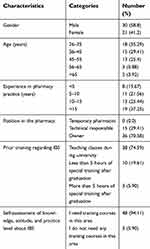 | Table 1 Demographic characteristics of participants (N=51) |
Total scores of knowledge, attitude, and practice at pre, post and follow-up stages regarding educational intervention for the pharmacist are shown in Table 2.
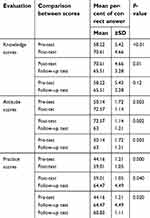 | Table 2 Comparison of knowledge, attitude, and practice levels in the pre, post, and follow-up tests |
Table 3 shows the relationship between participants’ demographic data and KAP components before the training course.
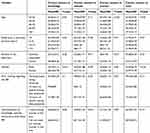 | Table 3 Relationship between participants’ demographic data and KAP components (N=51) |
After holding the training session (post-test) and also 3 months later (follow-test), knowledge, attitude, and practice of the pharmacists had increased significantly during post and follow-up stages (P<0.01). However, there was no significant difference between the effects of studied variables, such as gender, age, and any training history with improving the results of post and follow-up tests (P>0.05).
Discussion
To the best of our knowledge, this is the first study to describe the knowledge, attitude, and practice of community pharmacists regarding IBS in Iran, and one of the first worldwide. IBS is a common functional gastrointestinal disorder with the prevalence of around 11% globally.14 Since the symptoms are chronic and annoying, and often improved by common non-prescription drugs, such as acid-suppressives, fiber and bulking laxatives, and anti-flatulents; patients generally prefer to take these medications in a chronic and arbitrary manner.15 Consequently, it is necessary for pharmacists, as a member of the healthcare professional team who are often approached by patients, to have sufficient knowledge about IBS.
In our study, the average percentage of correct answers in all three parts of knowledge, attitude, and practice of all participants was about 44%, which is not an acceptable score for a pharmacist who is in constant contact with patients. This issue emphasizes the importance of improving the educational content at universities and holding training courses after graduation in a continuous manner. The average percentage of correct answers on knowledge at pre-test was higher than attitude and practice. This result was in line with the results of Al-Hazmi's16 study, which assessed the knowledge of IBS among physicians. There was a general lack of awareness of IBS practice according to our results, with poor a mean score, although this is the most important element for pharmacists. Patients education by pharmacists and giving appropriate advices to patients with IBS is mostly relevant to the practice filed; therefore, it is necessary to pay more attention to the improvement of pharmacists’ practice by providing educational classes. Our results showed that the average percentage of correct answers to the knowledge questions varied amongst different age groups; so that, with an increase in age, the average percentage of correct responses reduced, which might be due to the fact that younger pharmacists have graduated recently and their knowledge is more updated. Unlike knowledge, work experience had a positive effect on attitude and practice.
Comparisons between the results of before and after the educational class showed that training pharmacists had a significant impact on increasing their knowledge, attitude, and practice level in IBS (P<0.01). The education was able to raise the level of knowledge, attitude, and practice scores of pharmacists, regardless of their gender, age, and educational background.
The increase was mostly observed in the field of attitude, then in practice and knowledge. The findings are consistent with the results of Jha et al,17 who studied the effect of an educational intervention on knowledge and attitude regarding pharmacovigilance amongst pharmacists, as well as the results of a study by Longstreth and Burchette10 on the effect of physicians’ education about IBS.
As can be seen in Table 3, the average percentage of correct answers in the knowledge section was significantly different between genders; in that the women who participated in this study were more knowledgeable than men, but there were not significant gender differences in attitude or practice scores. Moreover, there was no significant difference between the ownership positions’ variable and the average correct answers to questions on knowledge, attitude, and practice.
In respect of the self-assessment variable, the pharmacists who claimed that they felt the need to attend training courses scored lower than those who declared no need for the training course about IBS.
This study also investigated the effect of any prior history of education about IBS on the percentage of correct answers. Although pharmacists who had been trained more hours on IBS achieved higher scores in most parts, in general there were no significant differences between the participants.
As the results show, there was no significant relationship between work experience and correct answers to the questions of any of the three sections. According to the results, passing of time has caused a decrease in correct responses of pharmacists to knowledge and attitude questions in a significant manner. This reduction emphasizes the importance of paying attention to the continuous training classes to improve pharmacist knowledge. The practice results level of pharmacists in our follow-up test was better than that of the post-educational test. This matter indicates that passing of time had the least effect on the level of practice, which was in contrast to knowledge and attitude.
Due to the significant rise in follow-up scores in comparison with baseline score for KAP, we suggest that continuing pharmacy education (CPE) can affect the Community pharmacist’ skills in a positive manner, so implementing the CPE for lifelong learning and professional development is advised.18 By considering these facts, there is a serious need for educational and continuous training programs, workshops, and seminars for the pharmacists to provide appropriate patient education, counseling, and other activities revolving around professional practice in IBS. As far as we know, there are no such programs available in our region. Providing CPE programs can be momentous in preparation of the pharmacist to meet the increasing expectations of patients.19
In our study many participants stated that they required an educational course on IBS, and their knowledge in this regard dated back to their training classes at university.
There are different ways of incorporating continuing education into the pharmacist practice. Budzinski et al20 reported that reading highlight selections and completing Web-based questionnaires was found to be an effective mode of continuing education. However, lack of technological and internet skills among pharmacists would direct them more towards live sessions.21
Self-directed learning after graduation is another valuable way, in which people pursue learning throughout their life span.22 However this learning method has its limitations and a problem with this approach is that many individuals do not know what they need to learn on the subjects for which they have little knowledge.
This study had some limitations which have to be pointed out. First, this is the first study of its kind in Iran, and its results cannot be generalized for the entire Iranian pharmacists’ population. Therefore, in order to obtain a better result, multi-center studies should be conducted. Second, it is apparent that education is not the only effective factor in improving the level of knowledge, attitude, and practice; hence, to find the effective factors, it is necessary to conduct a case-control study. Third, the use of self-evaluation is an important limitation of KAP study. The best way to practice evaluation is through a direct observation instead of self-evaluation.
Conclusion
According to this study, an important issue is to continuously educate pharmacists after graduation to have updated information on IBS and its management. IBS course tended to have positive impacts on KAP of community pharmacists. In these training sessions, special attention should be given to the improvement of pharmacists’ practices.
Acknowledgments
This work was a part of a Pharm.D thesis (Number 587) written by Hamed Dehghanpour and was supported by the Research Council of Shiraz University of Medical Sciences, Shiraz, Iran.
Disclosure
The author reports no conflicts of interest in this work.
References
1. Sperber AD, Dumitrascu D, Fukudo S, et al. The global prevalence of IBS in adults remains elusive due to the heterogeneity of studies: a Rome Foundation working team literature review. Gut. 2017;66(6):1075–1082.
2. Khoshkrood-Mansoori B, Pourhoseingholi MA, Safaee A, et al. Irritable bowel syndrome: a population based study. J Gastrointestinal Liver Dis. 2009;18:4.
3. Chey WD, Kurlander J, Eswaran S. Irritable bowel syndrome: a clinical review. Jama. 2015;313(9):949–958. doi:10.1001/jama.2015.0954
4. Mujagic Z, Jonkers DM, Hungin APS, et al. Use of Rome criteria for the diagnosis of irritable bowel syndrome in primary care: a survey among European countries. Eur J Gastroenterol Hepatol. 2017;29(6):651–656. doi:10.1097/MEG.0000000000000848
5. Drossman DA, Morris CB, Schneck S, et al. International survey of patients with IBS: symptom features and their severity, health status, treatments, and risk taking to achieve clinical benefit. J Clin Gastroenterol. 2009;43(6):541. doi:10.1097/MCG.0b013e318189a7f9
6. Mehralian G, Yousefi N, Hashemian F, Maleksabet H. Knowledge, attitude and practice of pharmacists regarding dietary supplements: a community pharmacy-based survey in Tehran. Iran J Pharm Res. 2014;13(4):1457.
7. Santschi V, Chiolero A, Colosimo AL, et al. Improving blood pressure control through pharmacist interventions: a meta‐analysis of randomized controlled trials. Journal of the American Heart Association. 2014;3(2):e000718.
8. Siaw M, Ko Y, Malone D, et al. Impact of pharmacist‐involved collaborative care on the clinical, humanistic and cost outcomes of high‐risk patients with type 2 diabetes (IMPACT): a randomized controlled trial. J Clin Pharm Ther. 2017;42(4):475–482. doi:10.1111/jcpt.12536
9. Olafsdottir LB, Gudjonsson H, Jonsdottir HH, Jonsson JS, Bjornsson E, Thjodleifsson B. Irritable bowel syndrome: physicians’ awareness and patients’ experience. World J Gastroenterol. 2012;18(28):3715. doi:10.3748/wjg.v18.i28.3715
10. Longstreth GF, Burchette RJ. Family practitioners’ attitudes and knowledge about irritable bowel syndrome: effect of a trial of physician education. Fam Pract. 2003;20(6):670–674.
11. Davis LL. Instrument review: getting the most from a panel of experts. App Nursing Res. 1992;5(4):194–197. doi:10.1016/S0897-1897(05)80008-4
12. Hanafi S, Poormalek F, Torkamandi H, et al. Evaluation of community pharmacists’ knowledge, attitude and practice towards good pharmacy practice in Iran. J Pharm Care. 2015;1(1):19–24.
13. Hasnain S, Sheikh NH. Knowledge and practices regarding foot care in diabetic patients visiting diabetic clinic in Jinnah Hospital, Lahore. JPMA J Pakistan Med Assoc. 2009;59(10):687.
14. Canavan C, West J, Card T. The epidemiology of irritable bowel syndrome. Clin Epidemiol. 2014;6:71.
15. Faresjo A, Grodzinsky E, Johansson S, Wallander M-A, Faresjo T, Timpka T. Self-reported use of pharmaceuticals among patients with irritable bowel syndrome in primary care. J Managed Care Pharm. 2008;14(9):870–877. doi:10.18553/jmcp.2008.14.9.870
16. Al-Hazmi AH. Knowledge, attitudes, and practices of primary care physicians about irritable bowel syndrome in Northern Saudi Arabia. Saudi J Gastroenterol. 2012;18(3):173. doi:10.4103/1319-3767.96450
17. Jha N, Rathore DS, Shankar PR, et al. Effect of an educational intervention on knowledge and attitude regarding pharmacovigilance and consumer pharmacovigilance among community pharmacists in Lalitpur district, Nepal. BMC Res Notes. 2017;10(1):4. doi:10.1186/s13104-016-2343-5
18. Dopp AL, Moulton JR, Rouse MJ, Trewet CB. A five-state continuing professional development pilot program for practicing pharmacists. Am J Pharm Educ. 2010;74(2):28. doi:10.5688/aj740228
19. Manolakis PG, Skelton JB. Pharmacists’ contributions to primary care in the united states collaborating to address unmet patient care needs: the emerging role for pharmacists to address the shortage of primary care providers. Am J Pharm Educ. 2010; 74(10): S7.
20. Budzinski JW, Farrell B, Pluye P, et al. An online knowledge resource and questionnaires as a continuing pharmacy education tool to document reflective learning. Am J Pharm Educ. 2012;76(5):82. doi:10.5688/ajpe76232
21. Conte N. Pharmacists attitudes toward using the internet to satisfy their continuing education needs: an exploratory study. Currents Pharm Teach Learn. 2012;4(3):180–187. doi:10.1016/j.cptl.2012.04.010
22. Candy PC. Self-direction for lifelong learning. A comprehensive guide to theory and practice. Adult Educ Q. 1992;42(3):192–202.
Supplementary material
Dear participant
This survey is based on research that is supervized by clinical pharmacists of Shiraz University of Medical Science and is about irritable bowel syndrome (IBS).
Please read carefully the following questions. Choose correct answers (one or more than one) to the multiple choice questions.
We would appreciate your participation in our survey that will help us to identify and modify the weak and strong points related to our study.
All the information that will be collected by this survey will be confidential, and only the relevant information will be used for the graduation project.
Thank you for your active participation.
Demographic data:
Age:
Sex:
Job experience: Less than 5 years  5–10 years
5–10 years  10–15 years
10–15 years  >15 years
>15 years 
Did you ever have training regarding IBS?
1- Only teaching classes during university 
2- Less than 5 hours of special training after graduation 
3- More than 5 hours of special training after graduation 
Do you think you need any special training courses regarding IBS?
1- I need special education to improve my knowledge about IBS 
2- I know all the details about this disease and don’t need any more training courses 
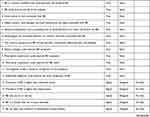 |
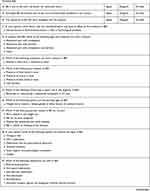 | (Continued). |
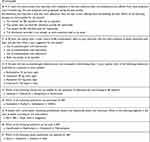 | (Continued). |
 © 2019 The Author(s). This work is published and licensed by Dove Medical Press Limited. The full terms of this license are available at https://www.dovepress.com/terms.php and incorporate the Creative Commons Attribution - Non Commercial (unported, v3.0) License.
By accessing the work you hereby accept the Terms. Non-commercial uses of the work are permitted without any further permission from Dove Medical Press Limited, provided the work is properly attributed. For permission for commercial use of this work, please see paragraphs 4.2 and 5 of our Terms.
© 2019 The Author(s). This work is published and licensed by Dove Medical Press Limited. The full terms of this license are available at https://www.dovepress.com/terms.php and incorporate the Creative Commons Attribution - Non Commercial (unported, v3.0) License.
By accessing the work you hereby accept the Terms. Non-commercial uses of the work are permitted without any further permission from Dove Medical Press Limited, provided the work is properly attributed. For permission for commercial use of this work, please see paragraphs 4.2 and 5 of our Terms.
